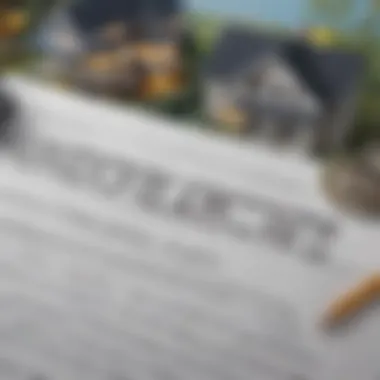Discovering Bank Owned Foreclosures in Your Area


Intro
Navigating the world of real estate can often feel like swimming in a sea of terminology and processes that seem as muddled as a jigsaw puzzle with missing pieces. This is especially true when it comes to bank owned foreclosed homes. Such properties often represent a unique opportunity for potential buyers, but they come with their own set of intricacies that require careful consideration.
Purchasing a bank owned foreclosure isn’t merely about finding a property that is priced to sell quickly. Instead, it involves understanding various financial considerations, knowing the right terms to employ, and being cognizant of the risks and rewards that accompany these transactions. Anyone eager to dive into this market needs a clear roadmap to help them make informed decisions.
Investment Terminology
Before embarking on the journey of finding a bank owned foreclosed home, it’s beneficial to familiarize oneself with some key investment terminology that will help elucidate the process.
Glossary of Key Terms
- Foreclosure: This refers to the legal process by which a lender takes ownership of a property after the borrower fails to meet the mortgage obligations.
- REO (Real Estate Owned): Properties that have been foreclosed and are now owned by the lending institution.
- Short Sale: A situation where a homeowner sells the property for less than what is owed on the mortgage, often needing the lender’s permission.
- BPO (Broker Price Opinion): An assessment of a property's market value typically conducted by real estate agents on behalf of banks.
- As-Is Sale: A sale wherein the buyer agrees to purchase the property in its current condition, with no repairs or guarantees from the seller.
Common Investment Acronyms
Understanding common acronyms can also streamline discussions about foreclosure properties:
- NPN (Non-Performing Note): A loan that is in default and is not being paid as agreed.
- LTV (Loan-To-Value): A ratio that compares the loan amount to the appraised value of the property, indicating risk.
- PITI (Principal, Interest, Taxes, Insurance): The full monthly mortgage payment that includes the principal and interest, along with property taxes and home insurance.
Equipped with this knowledge, potential investors and buyers can better navigate the complexities of purchasing bank owned foreclosed homes. In the following sections, we will further explore the steps to identify these valuable properties, weigh the ups and downs, and evaluate financial considerations crucial for making sound investments.
Understanding Bank Owned Properties
Navigating the waters of real estate can be a daunting task, especially when it comes to bank-owned properties. These homes, which have returned to a lending institution after the owner fails to make payments, possess unique characteristics that set them apart from traditional property sales. Understanding these properties isn’t just about recognizing what they are; it’s also crucial for anyone looking to capitalize on the current housing market.
Investors and homebuyers alike should have a solid grasp on bank-owned properties, as this understanding can open the door to exciting opportunities and potential pitfalls. The nuances in pricing, property condition, and even the purchasing process can vary significantly when compared to regular real estate transactions.
Definition of Bank Owned Properties
Bank owned properties, often referred to as Real Estate Owned (REO) properties, are houses that have been repossessed by a bank or lender. This situation typically arises after a foreclosure, which is the legal action taken by lenders to reclaim a property when the borrower defaults on their mortgage. Once the foreclosure process is completed and the home does not sell at auction, it becomes bank-owned. At this juncture, the bank assumes responsibility for the property.
These properties often come with considerable investment potential but also carry certain risks. Buyers can sometimes find themselves with a good deal, but understanding the specifics around this designation is fundamental to making informed choices.
Difference Between Foreclosure and Bank Owned
The terms "foreclosure" and "bank owned" are sometimes mistakenly used interchangeably, but they represent two distinct stages in the life cycle of a property.
- Foreclosure: This refers to the legal process in which a lender seeks to recover the balance of a loan from a defaulted borrower. During this process, the property may be sold at a public auction, and if it doesn’t attract buyers, it becomes a bank-owned product.
- Bank Owned: At this point, the bank has taken over the property after it has failed to sell at foreclosure auction. The bank now has to manage the property, including determining its value, making necessary repairs, and listing it for sale.
Grasping this difference is essential for anyone looking to dive into this market, as it impacts property valuation, the potential for bidding wars, and the overall negotiation process.
Reasons for Bank Ownership
There are several reasons why a bank might end up owning a property:
- Loan Default: As mentioned earlier, the initial reason often revolves around the borrower defaulting on their mortgage. When payments aren't made, the bank initiates foreclosure proceedings.
- Market Conditions: In a shifting real estate market, homes may not sell quickly, leading to properties languishing on the auction block.
- Maintenance Issues: Some properties may require extensive repairs or renovations, discouraging potential buyers and forcing the bank to keep ownership.
Ultimately, understanding why a bank holds a property helps prospective buyers assess the property’s situation and value more accurately. Buyers should approach these investments with caution, keeping an eye on the reasons behind each property’s bank ownership.
The Foreclosure Process
Understanding the foreclosure process is vital for anyone interested in bank owned properties. It grants insight into how properties transition from homeowner to bank, which is half the battle when considering a purchase. Knowing these stages can not only protect buyers but also provide leverage in negotiations. Understanding why a house ended up in foreclosure informs potential buyers of the challenges they might face. Moreover, acknowledging how businesses handle these properties can guide decisions on making offers, timing purchases, and budgeting for repairs or future investment.
Stages of Foreclosure
Foreclosure typically unfolds in several predictable stages:
- Pre-foreclosure: At this initial phase, the owner has missed mortgage payments. The bank sends notices, and the homeowner gets a chance to rectify the situation. It's a pivotal moment where buyers might find potential deals if the owner is willing to sell before the bank takes over.
- Foreclosure auction: If the property isn't sold during pre-foreclosure, it goes to auction. Here, the property is often sold to the highest bidder, which could be the bank or an investor. Buyers at this stage need to be ready to act fast, as bidding can be competitive and opportunistic.
- Real estate owned (REO): If the property doesn’t sell at auction, it becomes bank-owned. Typically, banks want to offload these properties quickly to minimize loss. This stage is where most buyers can interact directly with the bank and find favorable pricing.
- Post-foreclosure: Properties that remain on the market after REO may require more extensive marketing. They might face additional legal looms, potentially complicating sales further. Understanding these stages enables buyers to navigate effectively and gauge what to expect as they consider making a purchase.
Impact on Property Values
The foreclosure process has a noticeable impact on property values—not just for the homes directly involved but also for neighboring areas. As more homes enter foreclosure, it can create negative trends in property values nearby. This phenomenon occurs because fewer buyers are interested in homes when they see frequent foreclosures in a neighborhood.
- Neighborhood decline: More foreclosures often lead to vacant homes that may fall into disrepair, diminishing the aesthetic appeal of the area.
- Price corrections: Conversely, banks might price their REO properties aggressively, proving beneficial for buyers looking for deals. However, potential buyers need to keep an eye on how a fluctuating market can affect long-term investment.
- Long-term effects: Communities will often take years to fully recover from a wave of foreclosures, making site selection crucial for any purchase.
Legal Implications
The foreclosure process carries considerable legal repercussions—for owners and prospective buyers. Those interested in purchasing a bank-owned property must consider:
- Liens and encumbrances: Some foreclosures may carry attached debts. This means you might be buying a headache alongside the house. Having a title search conducted is essential to know exactly what you're getting into.
- Eviction processes: If the previous homeowners have not vacated the property when purchased, legal proceedings may be necessary. Knowing the laws in your state can prevent unforeseen complications.
- State regulations: Each state has its unique rules governing foreclosures. Buyers must navigate these laws to understand timelines, rights, and obligations during the buying process.
Legal complexities in foreclosure matters can lead to unexpected challenges; always consult an attorney before proceeding with a purchase.


In summary, a firm grasp of The Foreclosure Process equips buyers with the knowledge required to successfully navigate the intricacies of purchasing bank owned foreclosures. Understanding the stages, property value implications, and legal considerations can make for not just a smoother transaction, but potentially a profitable investment.
Finding Foreclosed Homes
Finding bank owned foreclosures isn't just a routine task for many aspiring homeowners or investors; it’s akin to hunting for hidden treasures in a market that’s often riddled with uncertainty. Understanding how to efficiently locate these properties is crucial, as opportunities can vanish faster than you can say "real estate market." The specific elements involved in this search reveal not just where these properties are, but also the benefits associated with making an investment in them.
Information is key here. Local listings can often be the first beacon of hope for potential buyers. Platforms that aggregate listings provide real-time data on properties available for sale, including distressed assets owned by banks. This not only gives a sense of market trends but also ensures that you don’t miss out on a great deal simply because of incomplete information. It’s beneficial to stay vigilant and consider multiple sources to maximize the chances of landing a deal with favorable terms.
Moreover, knowing how to search effectively online is indispensable in today’s tech-driven world. Utilizing various online resources allows buyers to pinpoint the locations and conditions of properties, streamlining the buying process. It can help identify properties that fit your financial strategy, be it for your own family or as investment opportunities.
Finally, bringing in a real estate agent who understands the nuances of foreclosures can be a game-changer. Not only do they have access to a wider network, but they also have the experience necessary to guide buyers through potential pitfalls and offer insights based on market knowledge. So, whether you’re making the plunge into homeownership or eyeing a foreclosed property as your next investment, understanding how to find these homes places you one step ahead.
Searching for Local Listings
Locating foreclosures begins with a deep dive into local listings. Utilizing local real estate platforms can yield a plethora of options right in your neighborhood. These listings often provide detailed descriptions, including property conditions, asking prices, and any unique features that may catch an investor's or buyer's eye.
While searching these listings, users should look for key indicators that might signal a worthwhile opportunity, such as:
- Days on the Market: A longer duration might indicate a more negotiable price.
- Price Reductions: Frequent cuts in the asking price often suggest the bank is eager to sell.
- Property Condition and History: This can give insights into whether it’s a fixer-upper or needs minimal work.
It’s wise to keep your options open; sometimes, the perfect property could be hiding in plain sight if you know where to look.
Utilizing Online Resources
The digital age has ushered in unprecedented access to information relevant to purchasing foreclosures. With websites specifically tailored to home buying, the data they provide can be vast and beneficial. Sites such as Realtor.com or Zillow not only display listings but also include filters for bank-owned properties, making navigation straightforward.
A few important online resources that can assist in this quest include:
- Public Records Websites: These platforms often maintain foreclosure notices, listing properties that may not be widely advertised yet.
- Bank Websites: Some financial institutions maintain lists of their own repossessed properties, providing first-hand details straight from the source.
- Real Estate Forums: Online communities can serve as informal advice hubs where members share insights and experiences.
Online resources enable potential buyers to gather data, analyze trends, and carefully choose the property that best aligns with their investment goals or personal needs, all from the comfort of their homes.
Hiring a Real Estate Agent
Bringing in a skilled real estate agent can truly simplify the process of finding a bank-owned home. An expert agent not only has their finger on the pulse of the local housing market, but they can also navigate the complex waters of buying distressed properties. They oftentimes have insider information about properties that are in the pipeline for sale and can act quickly once they hit the market.
Here are several points to consider when working with a real estate agent:
- Network Access: A seasoned agent likely has connections that can expose you to opportunities before they are listed publicly.
- Experience with Negotiations: They can guide you on how to present a competitive offer and protect your interests throughout discussions.
- Understanding of Financing Options: They can also walk you through various financing options available specifically for foreclosures and distressed properties.
Choosing the right agent can make a world of difference in your search for a bank owned foreclosure, as they bring experience and expert knowledge to the table.
Evaluating Bank Owned Properties
Evaluating bank owned properties is a crucial step in the journey of purchasing a foreclosed home. Understanding the specifics of these properties is imperative for potential buyers. Not only does it shine a light on the pros and cons associated with such purchases, but it also aids in making informed financial decisions. The key is to look beyond the surface; evaluating these homes means diving deeper into what they offer and the potential pitfalls that may accompany them.
Key Factors to Consider
When assessing bank owned properties, several factors come into play:
- Location: The old saying, "location, location, location," rings true. Proximity to schools, hospitals, and shopping centers can significantly impact both your quality of life and the property's resale value.
- Market Trends: Stay attuned to your local real estate market. Understanding recent sales, average time on the market, and fluctuations can provide insights into how much you should pay for a property.
- Price History: Investigating the price history of a home can reveal whether the bank is offering a fair deal. If the foreclosure price seems too steep based on past transactions, it may raise red flags.
- Renovation Potential: Many bank-owned properties come with the need for repairs. Assessing the extent of necessary refurbishment and estimating costs should be a part of your evaluation.
Home Inspections and Appraisals
Getting a home inspection done is a non-negotiable step. Home inspections often uncover issues that are not visible during a casual walk-through. Structural problems, plumbing issues, and roof conditions can turn an apparently good deal sour. Additionally, appraisals provide an objective value of the home based on comparable sales in the area. You may find that an appraisal aligns well with your budget, but if it comes in low, you'll need to reconsider your offer or negotiate with the bank.
Quote: "A thorough inspection can save you a world of trouble; skipping it is like driving blindfolded into oncoming traffic."
Understanding Property Condition
Knowing the condition of a bank owned property is essential in your evaluation process. Foreclosed homes often face neglect before the bank acquires them. Here are a few factors to keep an eye out for:
- Exterior Damage: Look at roofing, siding, and landscaping. Damage outside can indicate issues that might also affect the interior.
- Interior Wear and Tear: Check the state of plumbing, electrical systems, and appliances. This can make the difference between a small fix and a major renovation.
- Safety Hazards: If there are noticeable hazards, such as mold or outdated wiring, these can pose risks that may not be easily remedied without significant investment.
Evaluating extends beyond simply viewing listings; it's an analytical process that requires attention to detail and an understanding of potential future consequences. By carefully examining these factors, you arm yourself with the knowledge necessary to navigate the intricacies of purchasing bank owned properties.
Financing Options for Foreclosed Homes
Financing is a crucial aspect of purchasing bank owned foreclosed homes. It often determines not only your buying power but also affects the overall cost of the home. Understanding financing options can help make a tough journey a bit smoother. When you’re exploring the market for these properties, it’s wise to be well-versed in the various available financial avenues that cater to different circumstances and needs.
Types of Financing Available
When it comes to financing bank owned properties, several types of loans can be considered. Here are some common options:
- Conventional Loans: These are mortgages that are not backed by the government and usually require a credit score of around 620 or higher. They come with either fixed or adjustable rates.
- FHA Loans: The Federal Housing Administration backs these loans. They can be fantastic for first-time buyers with low down payments and flexible credit requirements.
- VA Loans: For veterans and service members, the Department of Veterans Affairs offers loans with favorable terms, usually requiring no down payment at all.
- USDA Loans: If you’re looking in rural areas, USDA loans are another option. These loans encourage home purchases in qualifying rural areas with zero down payment options.
- Hard Money Loans: These are loans from private lenders that often have faster approvals but can come with higher interest rates. They target quick transactions, which is beneficial if you're eyeing a competitive real estate market.


Preparing for Mortgage Approval
Once you have settled on the type of financing you wish to pursue, the next step is preparing for mortgage approval. This phase can be daunting but knowing what to expect can take some of the sting out. Here are some tips:
- Check Your Credit Score: Before anything else, your credit score plays a crucial role in getting approved. It's wise to check it at least months before applying and work on improving it if necessary.
- Gather Documentation: Lenders will ask for various documents including W-2 forms, tax returns, and pay stubs. Getting all this paperwork in order early can save you headaches down the line.
- Know Your Debt-to-Income Ratio: This ratio compares your monthly debt payments to your gross monthly income. Lenders typically want this to be below 43%.
- Be Pre-approved: Getting pre-approved for a mortgage gives you a better idea of how much you can afford. It also shows sellers that you are a serious buyer.
Understanding Down Payments
The down payment is a fundamental concept in home buying, and with foreclosures, it can vary significantly based on your financing choice. Here are key aspects to consider:
- Standard Down Payment: Typically, down payments range from 3% to 20%, depending on the type of loan you choose. For instance, FHA loans can allow as little as 3.5%.
- Closing Costs: Down payments are just part of the equation. You also have to account for closing costs, which can run anywhere from 2% to 5% of the purchase price.
- Saving Strategies: Many first-time buyers overlook the need for down payment savings. Start early, set aside money monthly, and consider down payment assistance programs if available.
It’s important to remember: Every penny counts. The more you can put down initially, the less your monthly mortgage payment will be.
In summary, understanding financing options is a stepping stone in the journey to owning a bank owned foreclosed home. From the types of loans available to the intricacies surrounding mortgage approval and down payments, each element is vital. So, make sure you are educated, prepared, and ready to grab a fantastic opportunity in the housing market.
Benefits of Buying Bank Owned Foreclosures
When it comes to the world of real estate, exploring bank owned foreclosures isn't just about snagging a deal; it's about understanding the layers that make these properties uniquely valuable. This section dives into some solid benefits that should pique the interest of investors and first-time buyers alike.
Potential for Lower Prices
The most alluring aspect of bank owned foreclosures is their cost. Often, these properties list for considerably less than their market value. Why? Specifically, banks want to sell these properties quickly to recoup their losses from the previous owners’ unpaid mortgages.
- Market conditions play a huge role. In a buyer's market, where supply surpasses demand, properties become even cheaper as banks compete to sell.
- Additionally, properties in less desirable neighborhoods may list for lower prices. If one has the stomach to see beyond the surface, these often overlooked gems might yield substantial bargains.
- Cash buyers can leverage their status to negotiate an even steeper discount, making it an enticing prospect for savvy investors.
"In real estate, it's all about timing and opportunity. Bank owned homes offer both, if you know where to look."
Investment Opportunities
Investing in bank owned properties can lead to fruitful returns, especially for those willing to put in some elbow grease. Many of these homes may require repairs or renovations, which might sound daunting, but it can also mean creating instant equity.
- Flipping: The common game plan is to buy, fix, and sell. After renovations, the potential profit margin can be impressive if the property’s value is restored and enhanced.
- Rental Income: For those not looking to flip immediately, bank owned properties can serve as excellent rental opportunities. Buying at a lower initial cost means the rental income can cover mortgage payments and still add to the bottom line.
- Long-term Appreciation: Besides immediate gains, there's also the potential for long-term price appreciation, particularly if the neighborhood experiences revitalization.
First-Time Homeowner Advantages
For the first-time homebuyer, navigating the property market can feel like a ride through a minefield. However, bank owned foreclosures often provide a pathway to home ownership that can seem both daunting and rewarding.
- Lower Purchase Prices: As mentioned earlier, the potential for lower costs makes it much easier to step into home ownership.
- Less Competition: Many first-time buyers might shy away from foreclosures, thinking it’s too complex. This means there might be less competition compared to standard home purchases, giving buyers an edge.
- Government Assistance Programs: First-time buyers can often access special financing or down payment assistance for foreclosures, making these deals even sweeter.
Risks of Purchasing Foreclosed Homes
Purchasing a foreclosed home can sometimes resemble walking a tightrope; it requires a keen sense of balance between the potential rewards and the risks involved. It’s vital to understand that although there are alluring benefits that come with these homes, the hidden pitfalls can be quite daunting. Far too often, eager buyers overlook various risk factors that might not be apparent at first glance. This section aims to illuminate the darker side of this real estate niche, empowering prospective buyers with crucial knowledge.
Hidden Costs and Repairs
One of the first traps buyers might stumble upon are the hidden costs associated with bank-owned properties. It’s not just about the purchase price; the expenses can snowball quickly. Although a house might seem like a steal, it could be hiding extensive repair needs. Home inspections that are often deemed optional in other markets become not only prudent but necessary in this segment.
After all, no one wants to find out six months down the road that their dream home has roof issues or plumbing nightmares. In fact, repairs can range from minor fixes like paint jobs to major overhauls involving structural repairs or replacing flooring. Expect to allocate budget for:
- Home inspections: Knowing what’s truly needed.
- Repairs: Don’t underestimate the costs; they can take a big bite out of your wallet.
- Utilities: Some properties may not have services activated. Reconnecting them can come with fees.
- Property Taxes: Bank-owned homes may have back taxes that need settling.
It’s better to examine a property closely to avoid unfortunate surprises later on.
Market Fluctuations
The real estate market can be as unpredictable as the weather. One moment it’s sunny, prices are soaring, and the next it’s pouring, and values plummet. Market fluctuations pose a significant risk to anyone considering investment in foreclosures. As is often the case, the value of a property can be influenced by outside forces—local economy shifts, changes in interest rates, or even new developments in the area.
It’s essential to stay informed about the market trends in your locality. If the market happens to be in a downslide, buying a foreclosed home at what seems like a bargain price might ultimately lead to losses. Timing is crucial, and falling prices could mean homeowners find themselves with a property worth less than what they invested in. Factors to consider include:
- Local Market Analysis: Stay updated to make informed decisions.
- Timing of Purchase: Catching a shift in the market may lead to financial advantage or disaster.
- Seasonal Variables: Often, prices dip in certain seasons.
Legal Complications
Legal entanglements can loom large when purchasing foreclosed properties. It’s essential to be aware of the legal complications that may arise—not only concerning the property itself but also with its previous owner. There may be unresolved liens, potential claims, or even occupied properties that complicate matters.
Understanding local laws surrounding foreclosures is paramount. Without this knowledge, you might inadvertently walk into a legal labyrinth that's tricky to navigate. Key legal issues to be aware of include:
- Eviction Processes: If the preceding owner or tenants are still residing in the home, their removal can be a drawn-out legal process.
- Liens and Encumbrances: Check for any outstanding debts tied to the property that can become your burden.
- Unforeseen Costs: Legal fees associated with resolving any issues can quickly add up.
Ultimately, prospective buyers must approach the process of acquiring bank-owned homes with caution and due diligence. Equipping oneself with knowledge about hidden costs, market conditions, and potential legal hurdles can make the difference between a dream investment and a financial nightmare.
Navigating the Purchase Process
Understanding the process of purchase is crucial for anyone considering bank owned foreclosures. It’s not just about finding a property that catches your eye; it’s about navigating a road filled with unique challenges and opportunities. This part of the real estate journey becomes even more critical when dealing with homes that have a troubled past. You need to be prepared and informed.


Making an Offer
When you find a bank owned property that interests you, the next step is to make an offer. This might sound straightforward, but it requires a careful mix of research, strategy, and gut feeling. Unlike traditional buying, making an offer on a bank owned home may involve dealing directly with the bank, which has its own set of rules and expectations.
Before drafting your offer, assess the property’s market value and consider any repairs needed. A comparative market analysis can give you insight into similar properties in the area and help in determining a fair offer.
While most banks will expect a fair price, it’s essential to leave some room for negotiation. They might even counter your offer, which means being prepared for a back-and-forth is vital.
Consider including an escalation clause in your offer. This allows you to bid automatically higher if someone else makes a better offer, up to a pre-set limit. Keep in mind to include a pre-approval letter, as this signals that you are serious and financially capable of completing the purchase.
Closing the Deal
Once your offer is accepted, the next phase is closing the deal, and this can be a lengthy process with several components. Both parties need to agree on terms that often depend on negotiations with the bank.
During the closing process, ensure that all the documentation is in order—title, disclosures, and any lien information. It is also the right time to schedule a home inspection. Remember that this inspection could uncover issues that were not initially visible. If significant repairs come to light, it could be a negotiating point.
Closing costs and fees should also be closely reviewed. Since you are dealing with a bank, there might be specific fees that could come up. It's prudent to have a lawyer or an experienced real estate agent to help review everything and ensure that you are not being taken for a ride.
Post-Purchase Considerations
Finally, after closing the deal, you have a bank owned property that needs a little TLC. Post-purchase, it’s vital to address renovations if required, and ensure that you maintain the property well.
If the home is intended for investment, remember that the local market can shift rapidly. Keep an eye on property values in that area post-purchase, as well as any changes in local laws or trends that might affect your investment.
Don’t forget to also change the utilities into your name and set aside funds for any unexpected repairs. While bank owned properties can come at a lower price, the initial expenses and ongoing costs can quickly add up.
"In real estate, knowledge may just be as important as your capital. Understand the process, and you'll reap the benefits."
Navigating the purchase process for bank owned properties is both a challenge and an opportunity. By making informed decisions, from your initial offer all the way to what happens after keys are exchanged, you’ll set the foundation for successful ownership.
Searching for Local Foreclosure Resources
When it comes to exploring bank owned foreclosed homes, the initial step often hinges on finding adequate resources that can guide potential buyers. Local foreclosure resources serve as vital tools in identifying suitable properties, facilitating a smoother purchase experience. They're significant for several reasons, predominantly for enhancing the efficiency of the search process, reducing information overload and providing expert insights that can lead to better investment decisions.
Key Elements of Searching for Local Foreclosure Resources:
- Accessibility: Local resources ensure potential buyers have access to timely information on available properties in their region. This localized focus can lead to discovering homes that fit specific criteria without the noise of broader national listings.
- Networking Opportunities: Engaging with local resources presents opportunities to connect with others who share your interests, whether they are first-time buyers or seasoned investors. Those conversations can provide insights not commonly found online.
- Market Trends: Understanding the local market is crucial, especially in real estate. Resources often provide insights into pricing trends and what areas are hot or cooling down. This knowledge can enable buyers to make informed decisions.
Government Websites and Resources
Government websites related to housing and urban development can offer a wealth of economic data, as well as listings of foreclosures. These websites typically include information about federal programs targeting home buyers, offer helpful resources such as guides and tutorials, and display current listings of bank owned properties.
Utilize sites such as HUD.gov or your state’s housing agency. These platforms often include features that can make your search easier, including maps and filters that help narrow down properties according to your preferences, like location and price range.
Accessing foreclosures through government websites means you're likely to find homes that are foreclosed directly by federally insured lenders, increasing your options.
Local Real Estate Investment Groups
Joining local real estate investment groups is another beneficial avenue when searching for foreclosure resources. These groups often consist of like-minded individuals who are interested in buying properties, including foreclosures. By participating, you gain access to valuable information not always known to the public.
Members of these groups typically share leads on bank owned homes and might have exclusive access to listings before they become widely available.
In addition, real estate clubs often hold meetings and workshops that cover various aspects of the real estate market, including strategies for buying foreclosures. These events provide an interactive platform to discuss doubts, ask questions, and network, which can lead to fruitful connections in the market.
Networking with Local Agents
Establishing connections with local real estate agents can be one of the most significant steps in your journey toward purchasing bank owned foreclosures. These professionals have their fingers on the pulse of the local market and are aware of properties that may not yet be listed.
Agents can also provide insights into the buying process specific to foreclosures and help navigate any legal considerations that may arise. When networking, it’s essential to engage with agents who specialize in foreclosure properties as they can offer knowledge and experience that general agents might lack.
Key Points in Networking with Agents:
- Local Knowledge: Agents who have worked in your area long enough understand what neighborhoods are worth exploring based on current and future trends.
- Negotiation Power: A seasoned agent can support buyers through negotiations, aiming to secure the best price possible.
- Streamlined Processes: They can guide you through the complex paperwork involved, ensuring you avoid any pitfalls.
"In real estate, local insights can often lead to better buy potential than simply relying on property listings found online."
By tapping into these networks, you position yourself advantageously in a competitive market.
Finale
In the labyrinthine world of real estate, understanding the nuances surrounding bank owned foreclosed homes proves to be essential for anyone contemplating an investment in this unique property sector. This article has unraveled the multifaceted dimensions that come into play when navigating this market, from the very definition of bank owned properties to the intricate processes involved in purchasing them. It is not just about finding a house at a bargain; it involves a deep dive into the implications, challenges, and opportunities associated with such purchases.
One of the critical elements discussed is the need for a comprehensive framework in evaluating foreclosures. Potential buyers must weigh factors such as property condition, financing options, and possible hidden costs. The risk is inherent, yet the potential benefits can be monumental. For investors, the chance to acquire properties below market value can lead to significant capital appreciation over time, demanding diligence and a calculated approach.
Moreover, understanding the local resources and market conditions enhances one's capacity to make informed decisions. The wealth of knowledge gathered through networking with real estate professionals, connecting with local investment groups, and referencing government resources establishes a strong foundation for success.
When one considers all these elements, it becomes evident that purchasing bank owned foreclosures isn't simply a transaction; it’s an intricate process laden with opportunities and pitfalls alike. The importance of being prepared and informed cannot be overstated.
"Knowledge is key when navigating the murky waters of foreclosures. It can be the difference between a sound investment and a regrettable misstep."
Ultimately, those who take the time to absorb the insights provided here will be in a better position to not just venture into the realm of foreclosure investments but to thrive within it. The road ahead may be riddled with challenges, but with the right knowledge, the potential for reward is distinctly visible.







